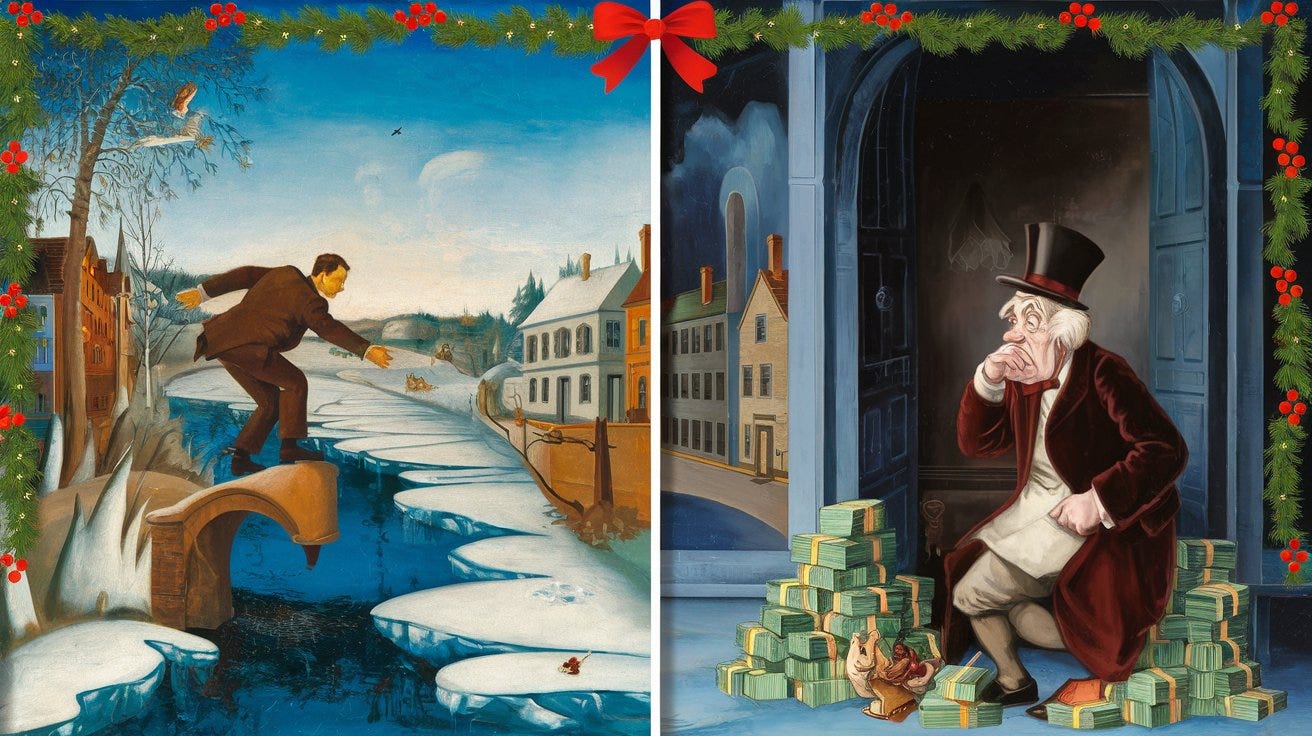George Bailey stands on the windswept bridge, ready to cast himself into the icy river and end his miserable existence.
The miserly Scrooge camps out in his joyless house, surrounded by piles of coins as Cratchit struggles to feed his family.
And here comes the Christmas conceit: Helpful angels/spirits descend to point out their delusions. Said less poetically, reality intervenes so forcefully that a reckoning is inescapable. Circumstances have diverged wildly from George and Ebenezer’s worldviews, forcing them to acknowledge their false perspectives and change forever.
Like cherubim blasting trumpets, like a fire from heaven illuminating the darkness of their souls, their errors burn away in one quick flash. They’re new men with new leases on life.
Redemption comes neatly packaged with a bow! If only life were so neat.
Yes, reality constantly shows us the error in our ways. Anyone paying attention can spot when theory diverges from reality and adjust accordingly.
Yet how many radical about-faces do we see in the real world?
If a bush bursts into flame without being consumed or an army of seraphim marches into our bedrooms, many of us find ways to explain it away. At scales large and small we bend and litigate reality until it fits into our existing worldview. This is human delusion — confirmation bias — at its most powerful. The lost job. The neglected body. The empty bank account. The pile of empty bottles.
They can all be slotted in and explained.
We look away from reality’s accusations and mumble whatever excuses suffice to save face. Escaping idiocy and finding freedom by acknowledging errors we’ve let into our identity is incredibly painful, so we’re “kind” to ourselves by refusing to change.
But slow suicides can be wrought through “kindness,” and though the body lives, all that’s worthwhile withers.
A Kabuki Theater of Epiphanies
I’m skeptical of people “hitting rock bottom” (subjective) and changing course. Sure, they might have a “come to Jesus” moment, but when they do it’s always a choice, and often not an honest one.
Since we can twist or deny reality and hide from its painful implications, all epiphanies are a kind of kabuki theater we willingly perform for ourselves, a palatable song-and-dance number woven to justify a new us.
Events never transform us against our will. Spirits never descend and force our hand. We retroactively peer back, squint, and decide some unexpected blow was the stuff from which we’ll carve a new self.
If you’ve failed your way through life till now, never living up to your potential, a moral reprobate, what does it signify? It signifies nothing. It’s not relevant to today or tomorrow beyond the story’s momentum. Yet it is the stuff of story, and stories matter.
Take your pick:
Your past failures speak of something broken deep inside you. This insufficiency is hardwired and inescapable. You should expect more of the same, and draw on your brokenness to justify the inevitable future failures to come.
You’ve learned so much from your failures. Like Thomas Edison inventing the lightbulb, you say, “I have not failed. I've just found 10,000 ways that won't work.” You’ve already tried the wrong ways, so you’ll have nothing but success from here on out. Onward and upward.
Oh, you like the second one better? It’s more hopeful, more useful for living a good life? Great. So run with it. But let’s not sugar coat it — it’s a story like the other one, and no more justified by reality. You choose the epiphany you want from the raw materials at hand.
The Everyday Epiphany:
Our past is gone and signifies nothing. Our future is unwritten but out of our control. All we have is now, and now is the only place change occurs.
If the stories were real and George Bailey and Ebenezer Scrooge maintained their new identities, they’d go through their remaining lives just like us, one day at a time. Each day, reality would test them.
Do you think Scrooge would find it easy to shed 60 years of miserly habit? That a year after A Christmas Carol, he wouldn’t think — as his coffers shrank from the 12th month of his generosity — it makes more sense to invest this money. Just one high-interest loan to a desperate merchant. Maybe two. Then I’ll start giving again.
Backsliding would call to him every day of his life, and every day he’d have to decide if he was going to live up to his new ideals.
If we want to be better than we were yesterday, we need to, like Socrates try to “know thyself.”
Epiphanies are Kabuki Theater. Transformation is the work of a lifetime. If you want to start, find a piece of paper:
Thanks for reading Socratic State of Mind.
If you liked this article, please like and share it, which helps more readers find my work.



